Analysis of Team Dynamics and Effectiveness at UWTSD London
VerifiedAdded on 2023/06/17
|8
|2339
|272
Report
AI Summary
This report examines the development and effectiveness of teams, particularly within the context of University of Wales Trinity Saint David (UWTSD) London. It covers how students can develop effective teams by prioritizing collaboration and individual responsibility, utilizing models like Tuckman's stages of group development (forming, storming, norming, performing). The report highlights the impact of effective teamwork on achieving success, emphasizing interpersonal skills, trust, accountability, and team cohesiveness. It also identifies barriers to effective teamwork, such as individuals avoiding duties, lack of discussion, and conflicts. Furthermore, it discusses the critical roles needed to create a cohesive and effective team, including coach, motivator, and conflict resolver, concluding that collective effort and problem-solving are essential for team success. Desklib offers this and many other solved assignments and past papers for students.

Individual Report
Paraphrase This Document
Need a fresh take? Get an instant paraphrase of this document with our AI Paraphraser
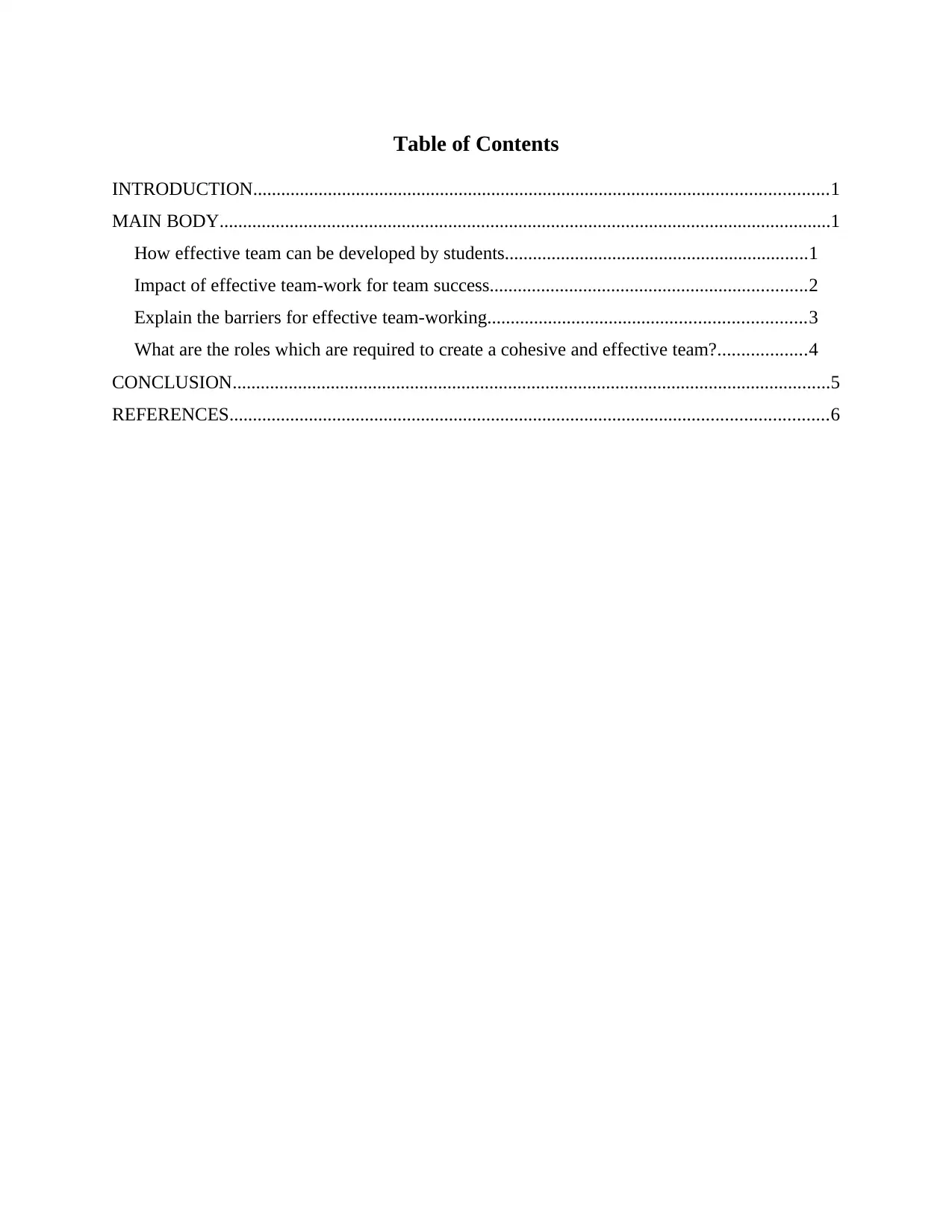
Table of Contents
INTRODUCTION...........................................................................................................................1
MAIN BODY...................................................................................................................................1
How effective team can be developed by students.................................................................1
Impact of effective team-work for team success....................................................................2
Explain the barriers for effective team-working....................................................................3
What are the roles which are required to create a cohesive and effective team?...................4
CONCLUSION................................................................................................................................5
REFERENCES................................................................................................................................6
INTRODUCTION...........................................................................................................................1
MAIN BODY...................................................................................................................................1
How effective team can be developed by students.................................................................1
Impact of effective team-work for team success....................................................................2
Explain the barriers for effective team-working....................................................................3
What are the roles which are required to create a cohesive and effective team?...................4
CONCLUSION................................................................................................................................5
REFERENCES................................................................................................................................6
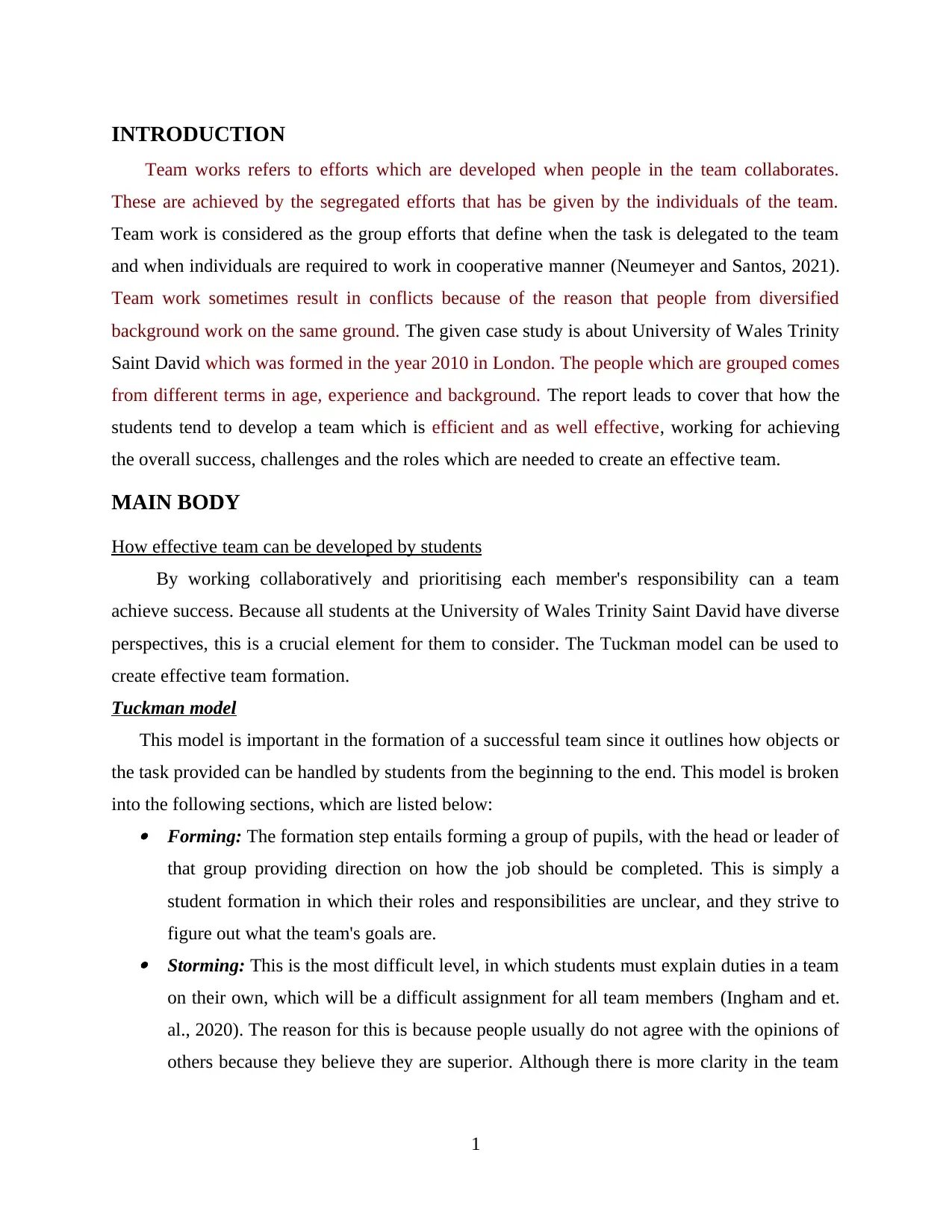
INTRODUCTION
Team works refers to efforts which are developed when people in the team collaborates.
These are achieved by the segregated efforts that has be given by the individuals of the team.
Team work is considered as the group efforts that define when the task is delegated to the team
and when individuals are required to work in cooperative manner (Neumeyer and Santos, 2021).
Team work sometimes result in conflicts because of the reason that people from diversified
background work on the same ground. The given case study is about University of Wales Trinity
Saint David which was formed in the year 2010 in London. The people which are grouped comes
from different terms in age, experience and background. The report leads to cover that how the
students tend to develop a team which is efficient and as well effective, working for achieving
the overall success, challenges and the roles which are needed to create an effective team.
MAIN BODY
How effective team can be developed by students
By working collaboratively and prioritising each member's responsibility can a team
achieve success. Because all students at the University of Wales Trinity Saint David have diverse
perspectives, this is a crucial element for them to consider. The Tuckman model can be used to
create effective team formation.
Tuckman model
This model is important in the formation of a successful team since it outlines how objects or
the task provided can be handled by students from the beginning to the end. This model is broken
into the following sections, which are listed below: Forming: The formation step entails forming a group of pupils, with the head or leader of
that group providing direction on how the job should be completed. This is simply a
student formation in which their roles and responsibilities are unclear, and they strive to
figure out what the team's goals are. Storming: This is the most difficult level, in which students must explain duties in a team
on their own, which will be a difficult assignment for all team members (Ingham and et.
al., 2020). The reason for this is because people usually do not agree with the opinions of
others because they believe they are superior. Although there is more clarity in the team
1
Team works refers to efforts which are developed when people in the team collaborates.
These are achieved by the segregated efforts that has be given by the individuals of the team.
Team work is considered as the group efforts that define when the task is delegated to the team
and when individuals are required to work in cooperative manner (Neumeyer and Santos, 2021).
Team work sometimes result in conflicts because of the reason that people from diversified
background work on the same ground. The given case study is about University of Wales Trinity
Saint David which was formed in the year 2010 in London. The people which are grouped comes
from different terms in age, experience and background. The report leads to cover that how the
students tend to develop a team which is efficient and as well effective, working for achieving
the overall success, challenges and the roles which are needed to create an effective team.
MAIN BODY
How effective team can be developed by students
By working collaboratively and prioritising each member's responsibility can a team
achieve success. Because all students at the University of Wales Trinity Saint David have diverse
perspectives, this is a crucial element for them to consider. The Tuckman model can be used to
create effective team formation.
Tuckman model
This model is important in the formation of a successful team since it outlines how objects or
the task provided can be handled by students from the beginning to the end. This model is broken
into the following sections, which are listed below: Forming: The formation step entails forming a group of pupils, with the head or leader of
that group providing direction on how the job should be completed. This is simply a
student formation in which their roles and responsibilities are unclear, and they strive to
figure out what the team's goals are. Storming: This is the most difficult level, in which students must explain duties in a team
on their own, which will be a difficult assignment for all team members (Ingham and et.
al., 2020). The reason for this is because people usually do not agree with the opinions of
others because they believe they are superior. Although there is more clarity in the team
1
⊘ This is a preview!⊘
Do you want full access?
Subscribe today to unlock all pages.

Trusted by 1+ million students worldwide
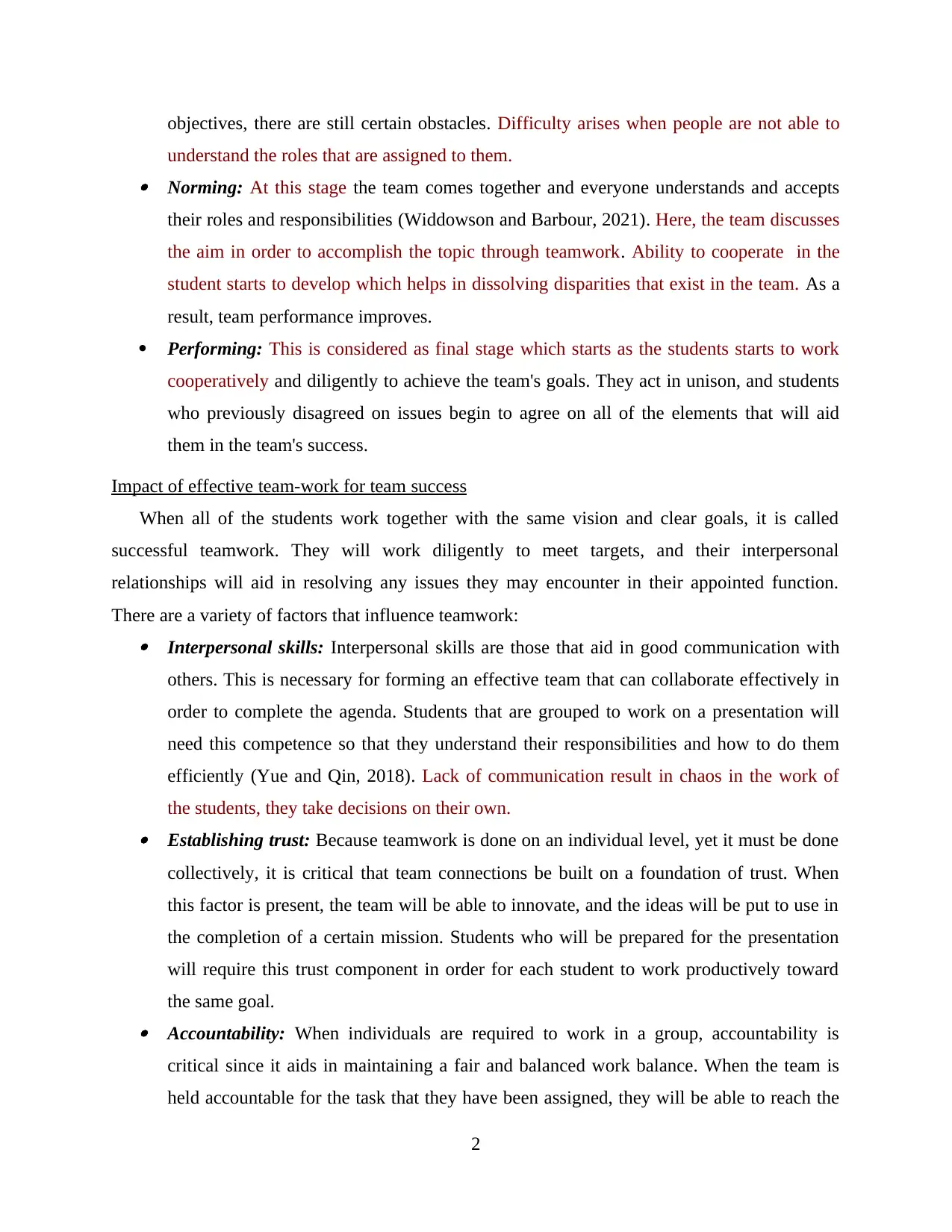
objectives, there are still certain obstacles. Difficulty arises when people are not able to
understand the roles that are assigned to them. Norming: At this stage the team comes together and everyone understands and accepts
their roles and responsibilities (Widdowson and Barbour, 2021). Here, the team discusses
the aim in order to accomplish the topic through teamwork. Ability to cooperate in the
student starts to develop which helps in dissolving disparities that exist in the team. As a
result, team performance improves.
Performing: This is considered as final stage which starts as the students starts to work
cooperatively and diligently to achieve the team's goals. They act in unison, and students
who previously disagreed on issues begin to agree on all of the elements that will aid
them in the team's success.
Impact of effective team-work for team success
When all of the students work together with the same vision and clear goals, it is called
successful teamwork. They will work diligently to meet targets, and their interpersonal
relationships will aid in resolving any issues they may encounter in their appointed function.
There are a variety of factors that influence teamwork: Interpersonal skills: Interpersonal skills are those that aid in good communication with
others. This is necessary for forming an effective team that can collaborate effectively in
order to complete the agenda. Students that are grouped to work on a presentation will
need this competence so that they understand their responsibilities and how to do them
efficiently (Yue and Qin, 2018). Lack of communication result in chaos in the work of
the students, they take decisions on their own. Establishing trust: Because teamwork is done on an individual level, yet it must be done
collectively, it is critical that team connections be built on a foundation of trust. When
this factor is present, the team will be able to innovate, and the ideas will be put to use in
the completion of a certain mission. Students who will be prepared for the presentation
will require this trust component in order for each student to work productively toward
the same goal. Accountability: When individuals are required to work in a group, accountability is
critical since it aids in maintaining a fair and balanced work balance. When the team is
held accountable for the task that they have been assigned, they will be able to reach the
2
understand the roles that are assigned to them. Norming: At this stage the team comes together and everyone understands and accepts
their roles and responsibilities (Widdowson and Barbour, 2021). Here, the team discusses
the aim in order to accomplish the topic through teamwork. Ability to cooperate in the
student starts to develop which helps in dissolving disparities that exist in the team. As a
result, team performance improves.
Performing: This is considered as final stage which starts as the students starts to work
cooperatively and diligently to achieve the team's goals. They act in unison, and students
who previously disagreed on issues begin to agree on all of the elements that will aid
them in the team's success.
Impact of effective team-work for team success
When all of the students work together with the same vision and clear goals, it is called
successful teamwork. They will work diligently to meet targets, and their interpersonal
relationships will aid in resolving any issues they may encounter in their appointed function.
There are a variety of factors that influence teamwork: Interpersonal skills: Interpersonal skills are those that aid in good communication with
others. This is necessary for forming an effective team that can collaborate effectively in
order to complete the agenda. Students that are grouped to work on a presentation will
need this competence so that they understand their responsibilities and how to do them
efficiently (Yue and Qin, 2018). Lack of communication result in chaos in the work of
the students, they take decisions on their own. Establishing trust: Because teamwork is done on an individual level, yet it must be done
collectively, it is critical that team connections be built on a foundation of trust. When
this factor is present, the team will be able to innovate, and the ideas will be put to use in
the completion of a certain mission. Students who will be prepared for the presentation
will require this trust component in order for each student to work productively toward
the same goal. Accountability: When individuals are required to work in a group, accountability is
critical since it aids in maintaining a fair and balanced work balance. When the team is
held accountable for the task that they have been assigned, they will be able to reach the
2
Paraphrase This Document
Need a fresh take? Get an instant paraphrase of this document with our AI Paraphraser
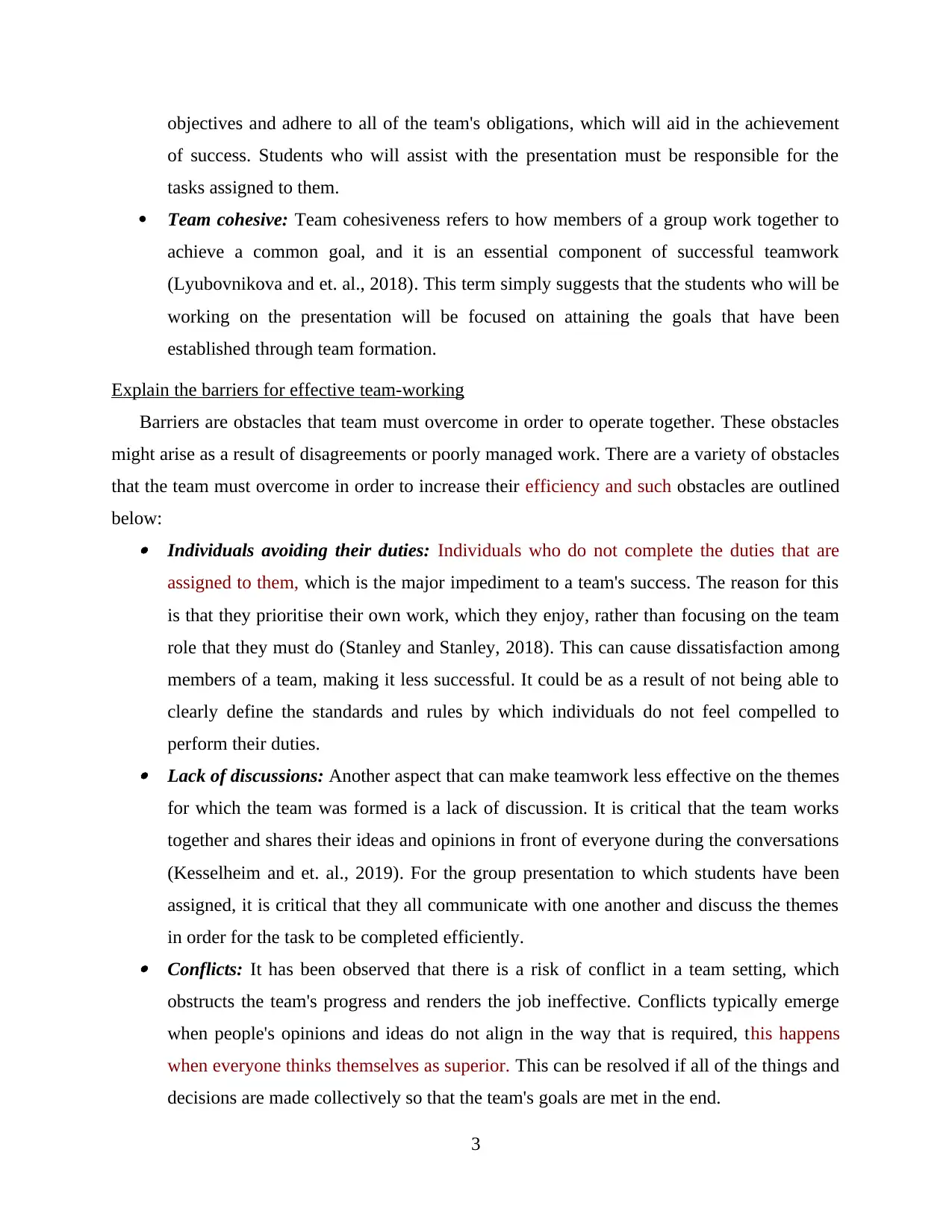
objectives and adhere to all of the team's obligations, which will aid in the achievement
of success. Students who will assist with the presentation must be responsible for the
tasks assigned to them.
Team cohesive: Team cohesiveness refers to how members of a group work together to
achieve a common goal, and it is an essential component of successful teamwork
(Lyubovnikova and et. al., 2018). This term simply suggests that the students who will be
working on the presentation will be focused on attaining the goals that have been
established through team formation.
Explain the barriers for effective team-working
Barriers are obstacles that team must overcome in order to operate together. These obstacles
might arise as a result of disagreements or poorly managed work. There are a variety of obstacles
that the team must overcome in order to increase their efficiency and such obstacles are outlined
below: Individuals avoiding their duties: Individuals who do not complete the duties that are
assigned to them, which is the major impediment to a team's success. The reason for this
is that they prioritise their own work, which they enjoy, rather than focusing on the team
role that they must do (Stanley and Stanley, 2018). This can cause dissatisfaction among
members of a team, making it less successful. It could be as a result of not being able to
clearly define the standards and rules by which individuals do not feel compelled to
perform their duties. Lack of discussions: Another aspect that can make teamwork less effective on the themes
for which the team was formed is a lack of discussion. It is critical that the team works
together and shares their ideas and opinions in front of everyone during the conversations
(Kesselheim and et. al., 2019). For the group presentation to which students have been
assigned, it is critical that they all communicate with one another and discuss the themes
in order for the task to be completed efficiently. Conflicts: It has been observed that there is a risk of conflict in a team setting, which
obstructs the team's progress and renders the job ineffective. Conflicts typically emerge
when people's opinions and ideas do not align in the way that is required, this happens
when everyone thinks themselves as superior. This can be resolved if all of the things and
decisions are made collectively so that the team's goals are met in the end.
3
of success. Students who will assist with the presentation must be responsible for the
tasks assigned to them.
Team cohesive: Team cohesiveness refers to how members of a group work together to
achieve a common goal, and it is an essential component of successful teamwork
(Lyubovnikova and et. al., 2018). This term simply suggests that the students who will be
working on the presentation will be focused on attaining the goals that have been
established through team formation.
Explain the barriers for effective team-working
Barriers are obstacles that team must overcome in order to operate together. These obstacles
might arise as a result of disagreements or poorly managed work. There are a variety of obstacles
that the team must overcome in order to increase their efficiency and such obstacles are outlined
below: Individuals avoiding their duties: Individuals who do not complete the duties that are
assigned to them, which is the major impediment to a team's success. The reason for this
is that they prioritise their own work, which they enjoy, rather than focusing on the team
role that they must do (Stanley and Stanley, 2018). This can cause dissatisfaction among
members of a team, making it less successful. It could be as a result of not being able to
clearly define the standards and rules by which individuals do not feel compelled to
perform their duties. Lack of discussions: Another aspect that can make teamwork less effective on the themes
for which the team was formed is a lack of discussion. It is critical that the team works
together and shares their ideas and opinions in front of everyone during the conversations
(Kesselheim and et. al., 2019). For the group presentation to which students have been
assigned, it is critical that they all communicate with one another and discuss the themes
in order for the task to be completed efficiently. Conflicts: It has been observed that there is a risk of conflict in a team setting, which
obstructs the team's progress and renders the job ineffective. Conflicts typically emerge
when people's opinions and ideas do not align in the way that is required, this happens
when everyone thinks themselves as superior. This can be resolved if all of the things and
decisions are made collectively so that the team's goals are met in the end.
3
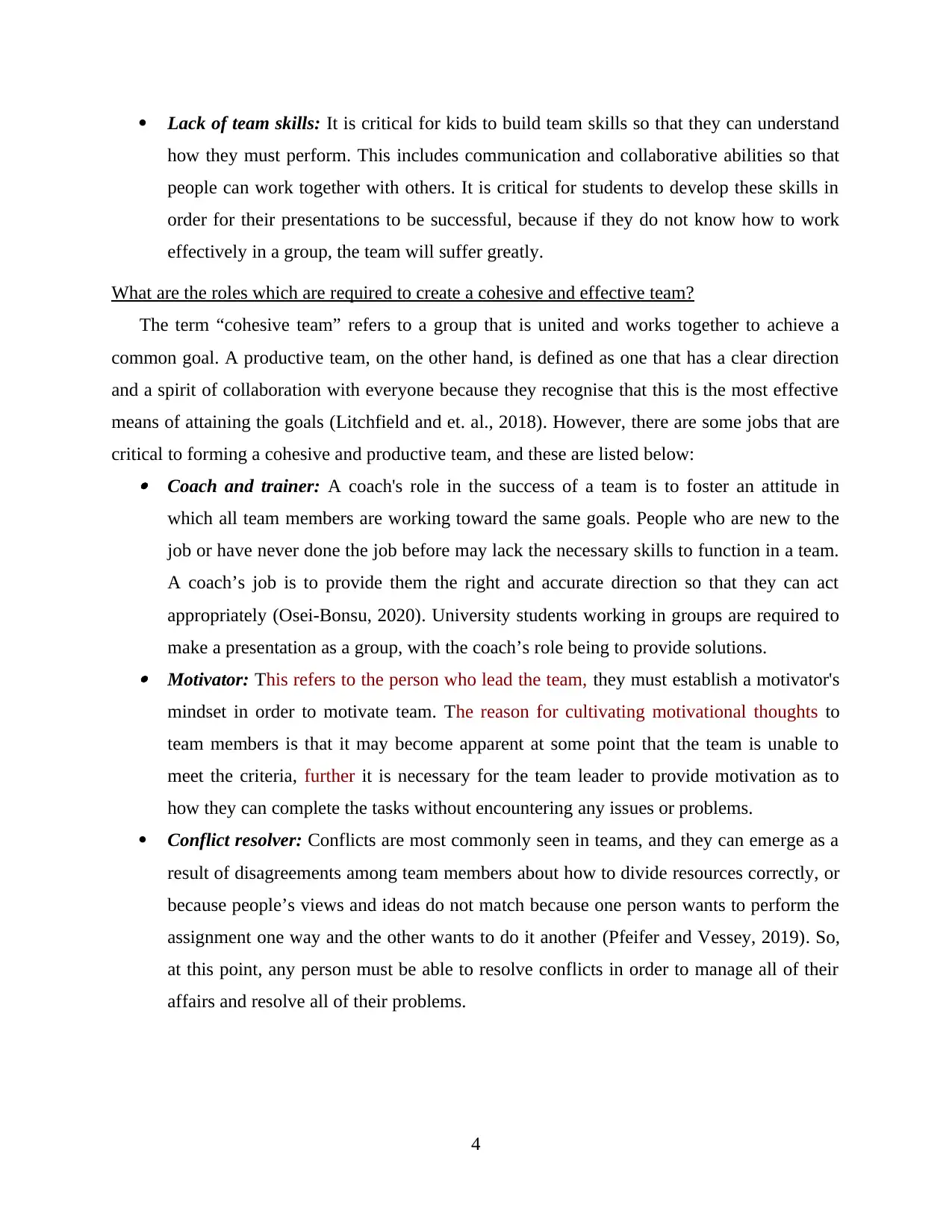
Lack of team skills: It is critical for kids to build team skills so that they can understand
how they must perform. This includes communication and collaborative abilities so that
people can work together with others. It is critical for students to develop these skills in
order for their presentations to be successful, because if they do not know how to work
effectively in a group, the team will suffer greatly.
What are the roles which are required to create a cohesive and effective team?
The term “cohesive team” refers to a group that is united and works together to achieve a
common goal. A productive team, on the other hand, is defined as one that has a clear direction
and a spirit of collaboration with everyone because they recognise that this is the most effective
means of attaining the goals (Litchfield and et. al., 2018). However, there are some jobs that are
critical to forming a cohesive and productive team, and these are listed below: Coach and trainer: A coach's role in the success of a team is to foster an attitude in
which all team members are working toward the same goals. People who are new to the
job or have never done the job before may lack the necessary skills to function in a team.
A coach’s job is to provide them the right and accurate direction so that they can act
appropriately (Osei-Bonsu, 2020). University students working in groups are required to
make a presentation as a group, with the coach’s role being to provide solutions. Motivator: This refers to the person who lead the team, they must establish a motivator's
mindset in order to motivate team. The reason for cultivating motivational thoughts to
team members is that it may become apparent at some point that the team is unable to
meet the criteria, further it is necessary for the team leader to provide motivation as to
how they can complete the tasks without encountering any issues or problems.
Conflict resolver: Conflicts are most commonly seen in teams, and they can emerge as a
result of disagreements among team members about how to divide resources correctly, or
because people’s views and ideas do not match because one person wants to perform the
assignment one way and the other wants to do it another (Pfeifer and Vessey, 2019). So,
at this point, any person must be able to resolve conflicts in order to manage all of their
affairs and resolve all of their problems.
4
how they must perform. This includes communication and collaborative abilities so that
people can work together with others. It is critical for students to develop these skills in
order for their presentations to be successful, because if they do not know how to work
effectively in a group, the team will suffer greatly.
What are the roles which are required to create a cohesive and effective team?
The term “cohesive team” refers to a group that is united and works together to achieve a
common goal. A productive team, on the other hand, is defined as one that has a clear direction
and a spirit of collaboration with everyone because they recognise that this is the most effective
means of attaining the goals (Litchfield and et. al., 2018). However, there are some jobs that are
critical to forming a cohesive and productive team, and these are listed below: Coach and trainer: A coach's role in the success of a team is to foster an attitude in
which all team members are working toward the same goals. People who are new to the
job or have never done the job before may lack the necessary skills to function in a team.
A coach’s job is to provide them the right and accurate direction so that they can act
appropriately (Osei-Bonsu, 2020). University students working in groups are required to
make a presentation as a group, with the coach’s role being to provide solutions. Motivator: This refers to the person who lead the team, they must establish a motivator's
mindset in order to motivate team. The reason for cultivating motivational thoughts to
team members is that it may become apparent at some point that the team is unable to
meet the criteria, further it is necessary for the team leader to provide motivation as to
how they can complete the tasks without encountering any issues or problems.
Conflict resolver: Conflicts are most commonly seen in teams, and they can emerge as a
result of disagreements among team members about how to divide resources correctly, or
because people’s views and ideas do not match because one person wants to perform the
assignment one way and the other wants to do it another (Pfeifer and Vessey, 2019). So,
at this point, any person must be able to resolve conflicts in order to manage all of their
affairs and resolve all of their problems.
4
⊘ This is a preview!⊘
Do you want full access?
Subscribe today to unlock all pages.

Trusted by 1+ million students worldwide
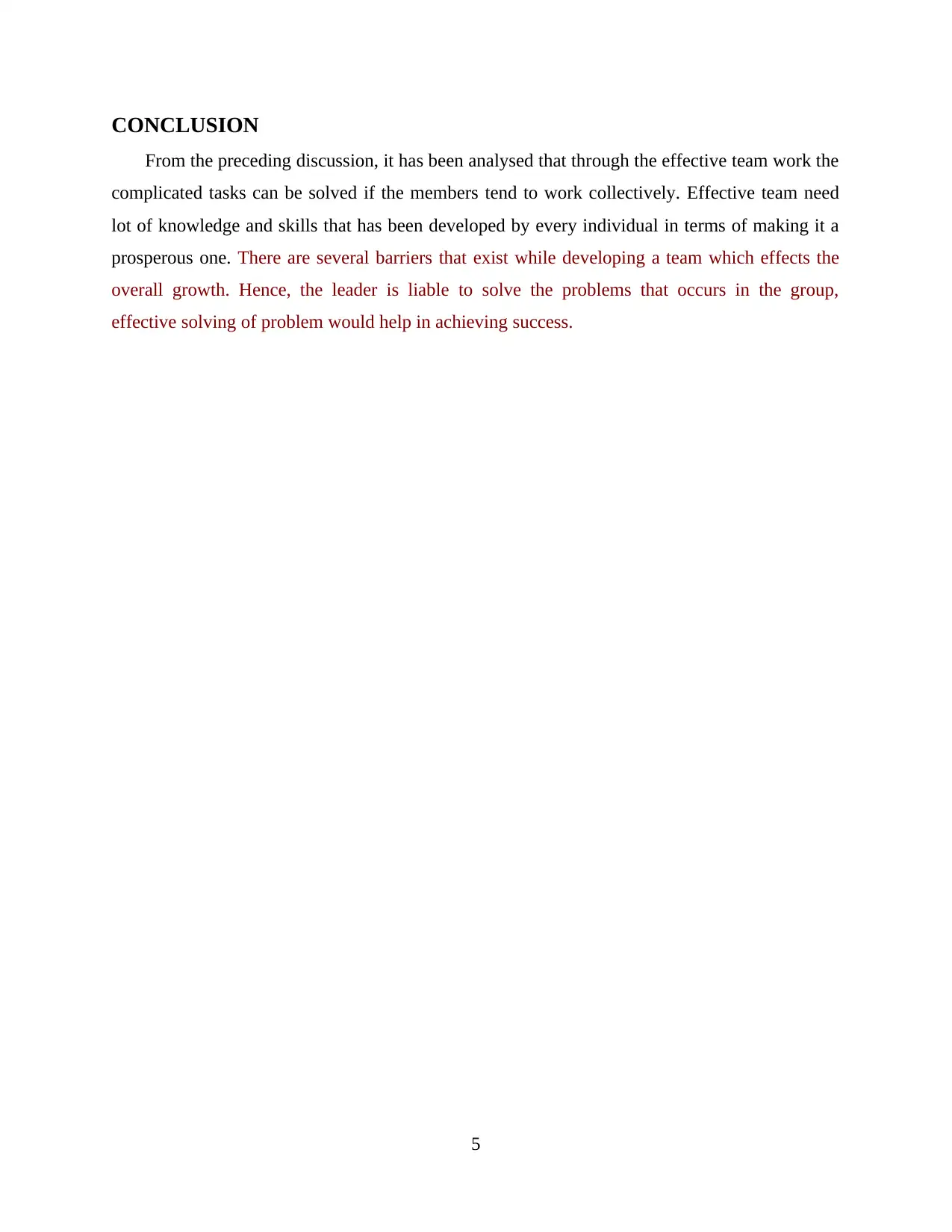
CONCLUSION
From the preceding discussion, it has been analysed that through the effective team work the
complicated tasks can be solved if the members tend to work collectively. Effective team need
lot of knowledge and skills that has been developed by every individual in terms of making it a
prosperous one. There are several barriers that exist while developing a team which effects the
overall growth. Hence, the leader is liable to solve the problems that occurs in the group,
effective solving of problem would help in achieving success.
5
From the preceding discussion, it has been analysed that through the effective team work the
complicated tasks can be solved if the members tend to work collectively. Effective team need
lot of knowledge and skills that has been developed by every individual in terms of making it a
prosperous one. There are several barriers that exist while developing a team which effects the
overall growth. Hence, the leader is liable to solve the problems that occurs in the group,
effective solving of problem would help in achieving success.
5
Paraphrase This Document
Need a fresh take? Get an instant paraphrase of this document with our AI Paraphraser
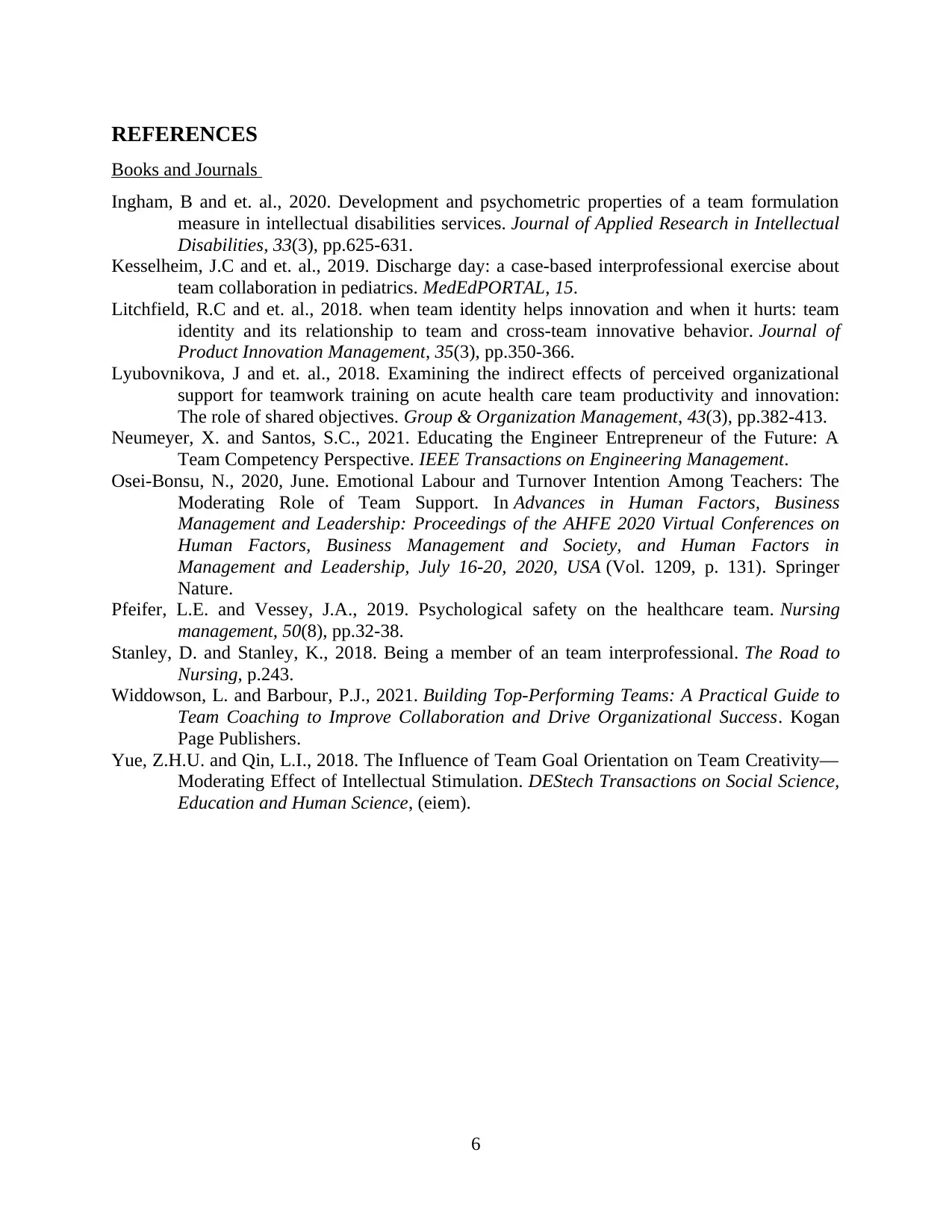
REFERENCES
Books and Journals
Ingham, B and et. al., 2020. Development and psychometric properties of a team formulation
measure in intellectual disabilities services. Journal of Applied Research in Intellectual
Disabilities, 33(3), pp.625-631.
Kesselheim, J.C and et. al., 2019. Discharge day: a case-based interprofessional exercise about
team collaboration in pediatrics. MedEdPORTAL, 15.
Litchfield, R.C and et. al., 2018. when team identity helps innovation and when it hurts: team
identity and its relationship to team and cross‐team innovative behavior. Journal of
Product Innovation Management, 35(3), pp.350-366.
Lyubovnikova, J and et. al., 2018. Examining the indirect effects of perceived organizational
support for teamwork training on acute health care team productivity and innovation:
The role of shared objectives. Group & Organization Management, 43(3), pp.382-413.
Neumeyer, X. and Santos, S.C., 2021. Educating the Engineer Entrepreneur of the Future: A
Team Competency Perspective. IEEE Transactions on Engineering Management.
Osei-Bonsu, N., 2020, June. Emotional Labour and Turnover Intention Among Teachers: The
Moderating Role of Team Support. In Advances in Human Factors, Business
Management and Leadership: Proceedings of the AHFE 2020 Virtual Conferences on
Human Factors, Business Management and Society, and Human Factors in
Management and Leadership, July 16-20, 2020, USA (Vol. 1209, p. 131). Springer
Nature.
Pfeifer, L.E. and Vessey, J.A., 2019. Psychological safety on the healthcare team. Nursing
management, 50(8), pp.32-38.
Stanley, D. and Stanley, K., 2018. Being a member of an team interprofessional. The Road to
Nursing, p.243.
Widdowson, L. and Barbour, P.J., 2021. Building Top-Performing Teams: A Practical Guide to
Team Coaching to Improve Collaboration and Drive Organizational Success. Kogan
Page Publishers.
Yue, Z.H.U. and Qin, L.I., 2018. The Influence of Team Goal Orientation on Team Creativity—
Moderating Effect of Intellectual Stimulation. DEStech Transactions on Social Science,
Education and Human Science, (eiem).
6
Books and Journals
Ingham, B and et. al., 2020. Development and psychometric properties of a team formulation
measure in intellectual disabilities services. Journal of Applied Research in Intellectual
Disabilities, 33(3), pp.625-631.
Kesselheim, J.C and et. al., 2019. Discharge day: a case-based interprofessional exercise about
team collaboration in pediatrics. MedEdPORTAL, 15.
Litchfield, R.C and et. al., 2018. when team identity helps innovation and when it hurts: team
identity and its relationship to team and cross‐team innovative behavior. Journal of
Product Innovation Management, 35(3), pp.350-366.
Lyubovnikova, J and et. al., 2018. Examining the indirect effects of perceived organizational
support for teamwork training on acute health care team productivity and innovation:
The role of shared objectives. Group & Organization Management, 43(3), pp.382-413.
Neumeyer, X. and Santos, S.C., 2021. Educating the Engineer Entrepreneur of the Future: A
Team Competency Perspective. IEEE Transactions on Engineering Management.
Osei-Bonsu, N., 2020, June. Emotional Labour and Turnover Intention Among Teachers: The
Moderating Role of Team Support. In Advances in Human Factors, Business
Management and Leadership: Proceedings of the AHFE 2020 Virtual Conferences on
Human Factors, Business Management and Society, and Human Factors in
Management and Leadership, July 16-20, 2020, USA (Vol. 1209, p. 131). Springer
Nature.
Pfeifer, L.E. and Vessey, J.A., 2019. Psychological safety on the healthcare team. Nursing
management, 50(8), pp.32-38.
Stanley, D. and Stanley, K., 2018. Being a member of an team interprofessional. The Road to
Nursing, p.243.
Widdowson, L. and Barbour, P.J., 2021. Building Top-Performing Teams: A Practical Guide to
Team Coaching to Improve Collaboration and Drive Organizational Success. Kogan
Page Publishers.
Yue, Z.H.U. and Qin, L.I., 2018. The Influence of Team Goal Orientation on Team Creativity—
Moderating Effect of Intellectual Stimulation. DEStech Transactions on Social Science,
Education and Human Science, (eiem).
6
1 out of 8
Related Documents
Your All-in-One AI-Powered Toolkit for Academic Success.
+13062052269
info@desklib.com
Available 24*7 on WhatsApp / Email
![[object Object]](/_next/static/media/star-bottom.7253800d.svg)
Unlock your academic potential
Copyright © 2020–2026 A2Z Services. All Rights Reserved. Developed and managed by ZUCOL.



